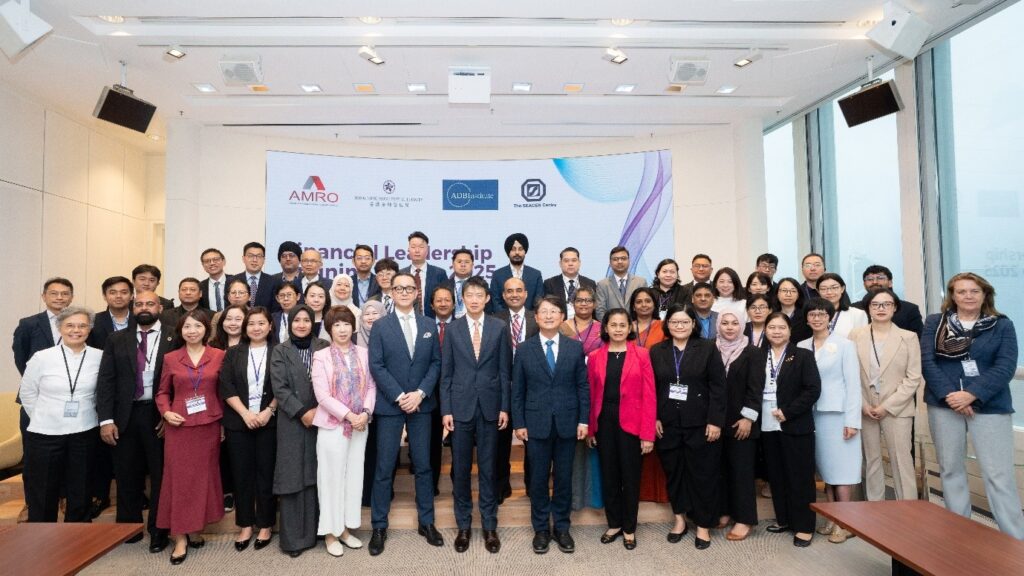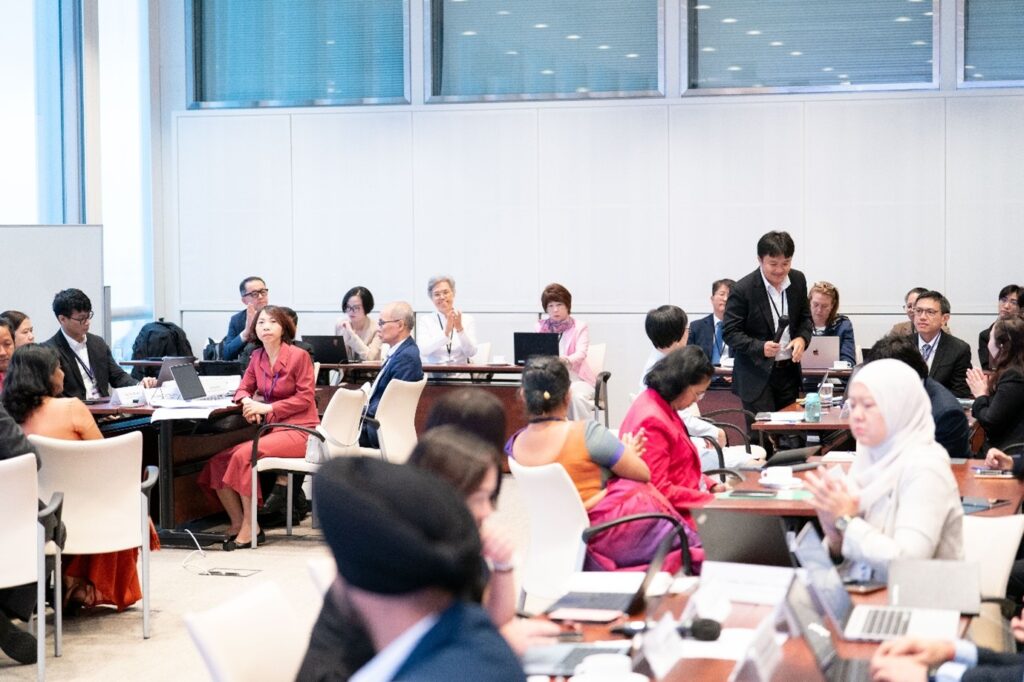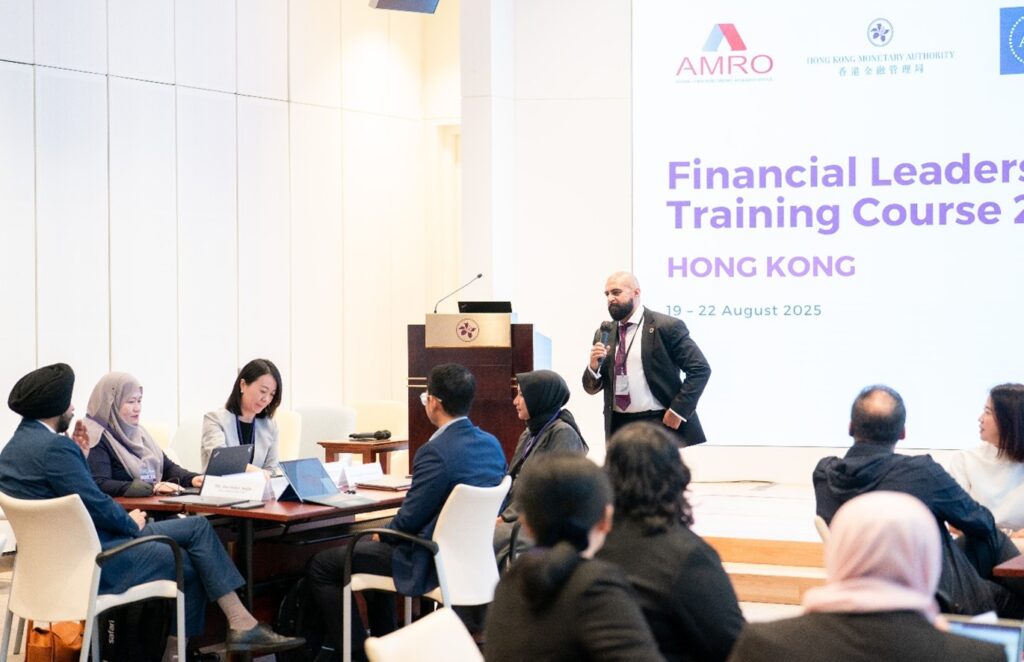When a record number of 40 officials from central banks, ministries of finance and regulatory authorities across ASEAN+3 and beyond gathered in Hong Kong, China, in August for the annual Financial Leadership Training Program, the agenda was revealing. This was not another technical workshop on interest rate mechanics or regulatory frameworks; the focus was squarely on leadership, communication, and strategic thinking—skills increasingly essential as policymakers navigate increasing complexity.
The program, jointly organized by AMRO with the Hong Kong Monetary Authority (HKMA), the Asian Development Bank Institute (ADBI), and the South-East Asian Central Banks Research and Training Centre (SEACEN), marked a significant expansion. For the first time, participants from India, Sri Lanka, and Nepal joined their ASEAN+3 counterparts, broadening perspectives on shared challenges.
The timing could not be more critical. The region faces mounting headwinds: manufacturing activity is declining across most ASEAN+3 economies, semiconductor-driven export gains are fading, and risks loom from US protectionism to climate change and demographic decline. More concerning is the region’s fiscal picture. Government debt-to-GDP and Gross Financing Needs to GDP ratios have risen sharply since the COVID-19 pandemic, leaving regional authorities with weakened buffers against future economic shocks. Recent surges in long-term bond yields in advanced economies offer a sobering preview of what could lie ahead.
Yet one of the program’s most valuable insights came from Kate Sweetman, The SEACEN Centre’s Director of Leadership, Governance and HR, who challenged participants to rethink what leadership means. Her research finding that Asian professionals want leaders with a compelling vision speaks to a deeper truth: technical competence alone is insufficient. It is therefore important for today’s leaders to develop behaviors such as cultivating mutual relationships to engage employees and help realize their ambitions.
Over two intensive days, participants grappled with change management, stakeholder engagement and influence without authority—capabilities that rarely feature in economics textbooks but prove essential when navigating political pressures, market volatility, and public skepticism.
The panel discussions underscored why these skills matter. When Sayuri Shirai, Professor of Economics at Keio University and Advisor for Sustainable Policies at the ADBI, detailed the pitfalls of carbon credit markets—from double counting to emissions simply shifting elsewhere—she was describing problems no algorithm can solve. Effective regulation requires judgment, persuasion, and balancing competing interests. Similarly, discussions on cross-border payment systems and decentralized finance revealed how rapidly innovation is outpacing regulatory frameworks, demanding agility and collaborative problem-solving.
The program’s role-playing exercises drove this home. Participants acting as corporate boards confronting nature-related risks or regional managers competing for resources, discovered how easily sound strategies flounder on poor communication or inadequate stakeholder management. Technical expertise must be complemented by emotional intelligence, strategic vision, and the ability to inspire others.
This reflects a broader recognition that today’s financial leaders must be climate experts, technology regulators, macroprudential supervisors, and crisis managers—often simultaneously. They must communicate complex decisions to a skeptical public, coordinate internationally, and maintain institutional credibility amid geopolitical turbulence.
The enthusiastic response from participants—some calling it the best training they had attended—suggests the program addresses a genuine gap. Participants had arrived expecting technical insights but departed with a framework for thinking about their roles as leaders rather than technicians.
This distinction matters because future challenges will not be solved by technical prowess alone. Whether managing the transition to net zero, adapting to artificial intelligence or navigating geopolitical fragmentation, ASEAN+3’s financial authorities need leaders who can articulate vision, build coalitions, and drive change through influence rather than diktat.
The program’s real value lies in the networks it forges across institutions—connections that will matter most when crisis strikes. Its emphasis on communication and strategic thinking acknowledges an uncomfortable truth: financial institutions succeed or fail not on the elegance of their models, but on their ability to navigate today’s challenges and persuade people.
As AMRO and its partners prepare for next year’s iteration, the ASEAN+3 Financial Leadership Training Program’s success suggests that investing in leadership development is not an indulgence but a necessity. The next generation will face challenges their predecessors could scarcely imagine. Ensuring they have not just technical tools, but leadership capabilities may prove one of the more consequential investments ASEAN+3’s economic and financial authorities make.



